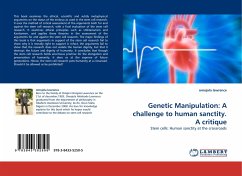This book discusses the moral concerns due to the increasing possibilities to predict individuals health on the basis of genetic testing. To what extent should such testing be performed? Which parties should be allowed to gain access to the results of such testing? The scope and limits of patients right to know and not know are presented. It is also argued that patients value of presymptomatic genetic testing ultimately rests on autonomy and subjective well-being. Moreover, a conception of autonomy is developed, which is useful to analyse the novel idea in this area that autonomy is a value that should be promoted. Regarding the question of blood relatives rights to genetic information, it is argued that we should generally leave the decision to inform relatives to the tested person. The idea that genetic information belongs to a new paradigm of medical information that is communal in its nature is criticized. Broader societal questions regarding e.g. insurance companies right togenetic information are also discussed. It is argued that the development of genetics strengthens the need for and defence of a comprehensive welfare state.
Bitte wählen Sie Ihr Anliegen aus.
Rechnungen
Retourenschein anfordern
Bestellstatus
Storno








